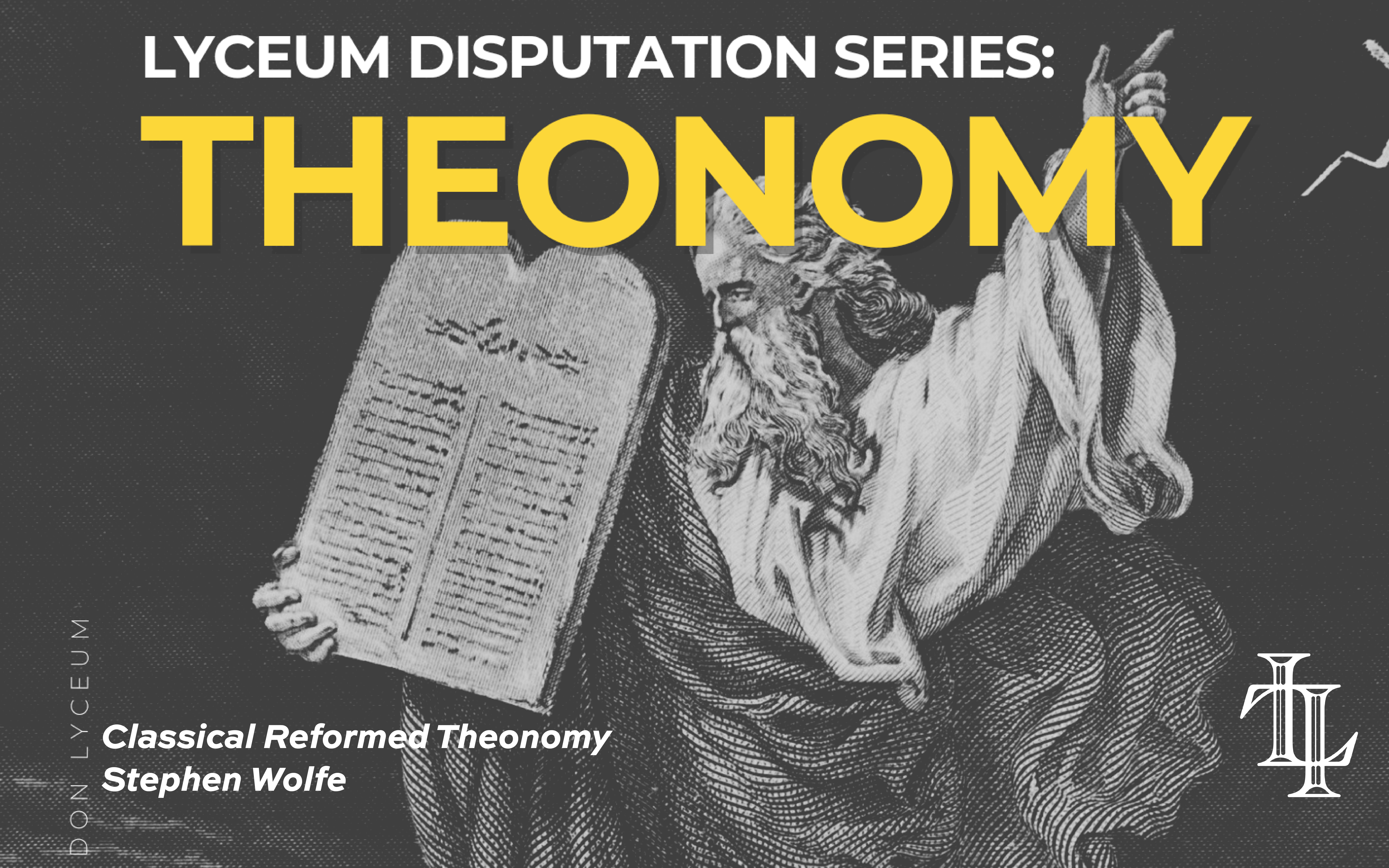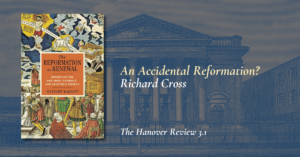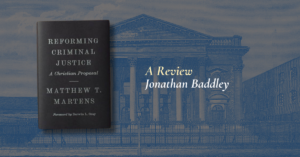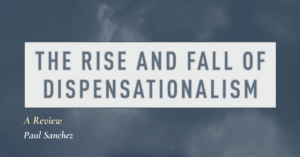Editor’s Note: This is part 4 in our Lyceum Disputation series considering the nature and validity of theonomy. Stay tuned for further installments. As with all our work, the London Lyceum publishes a range of viewpoints to encourage thinking.
I. Introduction
Theonomy has been the target of criticism for decades, and here we go again. From my experience, Christians are drawn to theonomy because it offers a seemingly coherent and actionable basis for Christian political activism and a positive, distinctively Christian vision for political order. I admit that I’m partly sympathetic to these people, given what is on offer in Reformed political theology. On one side, we have the neo-Kuyperians who tend to affirm forms of political liberalism, either explicitly or implicitly; and while many of them may be uncomfortable with recent social developments, their principles hardly seem able (nor do the Kuyperian seem willing) to confront or effectively “engage” these developments. On the other side, we have modern renditions of two-kingdoms theology, which purport to be historic. Two kingdoms theology was indeed the standard position among Reformed thinkers until the 20th century; I do not question that, and I hold to what might be called a classical Presbyterian version of the kingdoms. But it is hard to take seriously the argument that David VanDrunen has corrected the “inconsistency”[1] latent in hundreds of years of Reformed political theology and that resolving that inconsistency just happens to give us a political theology that comports well with the Post-World War II consensus of values (multiculturalism, anti-nationalism, anti-nativism, maximal religious liberty, and secularism). Christians of a certain disposition, upon seeing the ever-updating pride flags waving in the public square, might find Second-Table-Onlyism, shaped with an exilic ethos, a bit wanting.
We can further sympathize with those choosing theonomy because the theonomists were right about the trajectory of the West. They were right about the foolishness of overemphasizing the commonness of the “common kingdom.” The theonomists were right that Western culture was decadent and degenerate and that it would only get worse and become explicitly hostile to Christianity. They were right that the drift of modern Reformed political theology points to passivity and quasi-Anabaptism. Where but theonomy would Christians turn for some resolve?
This essay will present an alternative to both modern two-kingdoms theory and modern theonomy on civil law. It is not a novel position; it is (in my view) the historic Reformed view on civil law. The classical Reformed position on civil law is theonomic in a way: all just civil law derives from God’s law. The moral law of God—which is creational (or natural), universal, and immutable—grounds all true law for human society. And, as I’ll show, this law even grounds distinctively Christian civil law such that a body of law, as a whole, can be Christian. The primary intent here is to present the classical view of civil law—one that is consistent with the Reformed tradition—that appeals to the assertive spirit of theonomists and those who are drawn to it.
II. Law in General
God made man a reasonable creature, and so God placed man under a moral law. The moral law is a rule to life, for by it man achieves his natural ends. Reason is that faculty by which man discerns this law and judges what must be done and must not be done. Cicero famously wrote that “law is the highest reason, rooted in nature, which command things that must be done and prohibits the opposite.”[2] The reason of man permits him to discern and understand both the laws of his nature and why those laws are good for him.
We can proceed with a definition of law:
Law is an ordering of reason by an appropriate lawgiver for the good of the community.
This definition of law is true of all types of law: eternal, natural, and civil (or human). An ordering of reason is a public dictation of judgment for others by an authority who judges for the common good.
The natural law is an ordering of reason, consisting of moral principles that are innate in rational creatures, given by God, who is the author of nature. The natural law applies to every sphere of human life, not merely civil life; it is comprehensive. But being a set of universal principles, it requires particular applications according to the sphere in which one is acting and according to the circumstances of that sphere. The natural law orders family life, for example, providing its form, structure, and end, but natural principles require application by the familial authority to direct it to its end. No two families are exactly the same as to the specific judgments on what conduces to their good, yet both can, despite their varying judgments, achieve the end of family life.
Natural law prescribes universal principles and universal conclusions from those principles. As Reformed theologian Franciscus Junius (1545—1602) writes:
We call principles those that are known in themselves, are immovable, and (as the scholastic call them) are indemonstrable…just as, for example, “God exists,” and in life is “preserving our existence, our species, and justice.” We call common conclusions, however, those things that natural reason, with the light of nature leading the way, constructs from the principles, such as, for example, that God must be worshipped, and our life, our species, and the supports of justice must be cared for.[3]
These conclusions are universal and are the ground for action, but they are not prescriptive of action in themselves. They require a reasoning subject to make particular determinations (or applications) concerning concrete action. Determinations are practical decisions on what to do or not do, given the circumstances; and these can be individual, familial, civil, and ecclesiastical determinations. Junius, for example, discusses Deuteronomy 22:8, which requires one to “make a railing for your roof.” This is a determination (given by God) that follows from a principle and its subsequent conclusion, namely, “no one must be injured” and “nothing that could injure anyone may be built,” respectively.[4] The determination that roofs ought to have railings is suitable only if roofs in the community are designed or used in such a way that they might be hazardous. Most single-family homes today do not require railings, for ordinarily roofs are not hazardous. Though this determination is no longer relevant, the principle and conclusion remain valid, and building codes (which are determinations) recognize the same principle and conclusion.
Since every sphere of life is under natural law and natural law requires particular applications, it follows that every sphere of life requires a suitable authority, with a suitable power, to make determinations. For this reason, God has granted specific types of power by which the authorities of each sphere make judgments. The nature of each sphere dictates the species of power required. These powers and their differences are not arbitrary, but arise from the nature of each sphere.
III. Civil Law
Ordering of Reason
Civil determinations are civil laws. Now, civil laws are necessary for civil society because households in combination create problems of collective action that individuals and households cannot effectively resolve on their own. Put differently, social life apart from civil law creates gaps in judgment of what to do and what not to do. We have natural epistemic limitations, and so civil society requires rules of action for proper coordination. Absent these rules, we would unintendedly frustrate each other’s activities and ends. Imagine, for example, a community with cars that also lacks traffic laws. Without common rules, we would be unable to effectively coordinate our actions, even with the best intentions. This is why, as 16th century reformer Henry Bullinger (1504—1575) wrote, “[civil] laws undoubtedly are the strongest sinews of the commonweal.”[5] Civil laws coordinate our activities, making possible a collective life.
Since civil law is a species of law in general, we can define civil law as:
an ordering of reason, enacted and promulgated by a legitimate civil authority, that commands public action for the common good of civil communities.
Civil law is the outward and official expression of public judgment. Public judgment is simply the conclusion of the civil authority’s reasoning about suitable public action for the common good. Civil law is the enacted and promulgated form of public judgment, and so civil law is the outward and official expression of the civil authority’s reasoning about suitable action for the common good.
Civil law commands the outward man not from an authority in and of itself. Its authority, as Junius states, “proceed[s] by reason from those other preceding laws,” namely, the natural law.[6] Hence, it is a derived authority, and so laws are just only if they command what proceeds from God’s natural law. This derivative character is precisely why such laws bind our conscience to them. As Aquinas said, “[human] laws…have the power of binding conscience, from the eternal law whence they are derived [via natural law].”[7] However, a purported law that does not order according to reason is no law at all. That is to say, unjust laws are not laws, properly speaking, and so they do not bind the conscience to obedience. This position—expressed famously in Latin as lex iniusta non est lex— was affirmed from Cicero to Augustine through Aquinas to classical Protestantism. Zacharius Ursinus said, for example, that law “commands that which is upright and just, otherwise it is no law.” [8] Though this raises questions of tyranny and civil disobedience, the important point here is that civil law, when true and just, is neither arbitrary, nor has its force from the will of the magistrate alone; rather, it orders civil life in accordance with a higher law and has its force from that higher law. In this way, the magistrate mediates divine civil rule, as the one who determines appropriate action from natural law principles.
An important principle of civil law is that its reach is limited to things that the other spheres of life cannot effectively regulate to the common good. The individual, family, society, civil associations, and churches have primacy in ordering the things concerning their own spheres. Thus, civil law should not take from families, churches, and individuals what each sphere can best determine for itself. Still, there is much left for civil law to accomplish.
Civil Command
Civil command, being the command of magistrates, is what gives civil laws their life and force; it supplies the imperative to the judgment. Though civil command is backed by penalties for non-compliance, it is not inherently a coercive power. Reformed theologian Hermann Witsius (1636—1708) correctly wrote:
It is not the rigor of coercion that properly constituted a law, but the obligatory virtue of what is enjoined, proceeding both from the lawgiver, and from the equity of the thing commanded, which is here founded on the holiness of the divine nature, so far as imitable by man.[9]
Civil law is, after all, an ordering of reason; it is right practical reason. Since you should always follow right reason, you should always follow (just) civil law. Public judgment is both necessary for living well and natural for man to obey. Thus, civil command is not inherently coercive, for man is naturally willing to be directed in life from a civil authority. In our postlapsarian world, coercion has become a crucial element of civil command, for (given the state of man) only by threats of punishment can civil government adequately achieve its original end. It brings sinful man into compliance with the conditions for commodious civil life.
The correlate of civil command is civil obedience. The basis for obedience is not persuasion as to the specific reasons of any law, but deference to the lawgiver. Deference is necessary because private persons cannot determine many of the actions necessary for the common good, and most people will not be able to sufficiently judge the reasons for every action required of them. Thus, the motivating basis for obedience is deference to the lawgiver, who occupies a civil office obliging him to make judgments for the whole. The reasons for the action are the ultimate ground of obedience, but the act of deference presumes that sufficient reasons formed the lawgiver’s judgment. Obeying civil commands, therefore, is acting according to reason (when the commands are just), even though one may not fully comprehend the reasons for the action.
Deference does not require absolute obedience nor eliminate the possibility of just disobedience. The command is not itself the ultimate ground of action. Deference is simply the presumption that the lawgiver has good reasons for his judgments—the presumption that you are being ordered according to reason. But the absence of good reasons can become apparent to many in the community, either by examining the substance of the required action or its consequences. Our first impulse should be deference, but we are not helpless, amoral, non-rational beings, unable ever to judge the substance and consequences of our actions. Hence, just disobedience is still possible; deference can and ought (at times) to be suspended.
Righteous and Good Laws
Though natural law is a universal law, you cannot derive from it a universally suitable body of civil law. Bodies of law will vary in content based on peculiarities of geography, commerce, the people’s character, religious diversity, and numerous other types of circumstances. Some laws will be present in all or most civil societies, such as prohibitions of murder. These are universal because they are so close to human nature that they will not alter with changes in circumstances. But many laws are indeed based in circumstances and thus particular and mutable.
To understand why they are mutable, we should think of civil law in terms of principle, means, and end. The principle is ordering civil life in accordance with natural law principles and circumstances, and the end is a commodious, quiet, and godly life. The principle and end are immutable, for they are rooted in human nature and hence universally true for all civil orders, regardless of circumstance and moral integrity. The means, however, are mutable and vary, for their suitability is contingent on circumstances. The means are civil judgments concerning outward action. Civil law must order the community to its end in light of circumstances and in accordance with natural law. But since circumstances can change, so too can laws. Zanchi writes that civil laws that “are enacted for circumstances of place, time, and personality, cannot be eternal and unchangeable because their circumstances can change.”[10] Over time, some existing laws become ineffective and unnecessary; the reasons for them cease. They become laws in name only.
All just laws are both righteous and good. They are righteous when they inherently accord with the natural law; the commanded action is good in its substance. But being inherently righteous says nothing about their suitability for any given people. As Junius writes, “things that are absolutely and intrinsically good sometimes become evil in certain circumstances.”[11] Laws that oppose libel and slander are righteous, according to the 9th Commandment, as a means to protect reputations and to encourage honesty. But if these laws permit the adjudication of any perceived slight, the law itself would likely promote a litigious society and do harm. Consider also a law that permits unlicensed fishing on government land. It is intrinsically righteous and it may be good as well, if the fisherman are few and do not exploit the lack of regulation. But if the number of fishermen increases or abuses arise, this law can result in harm. Junius said that “there is a place in which a good or indifferent thing is rendered evil because it is out of place.”[12] Thus, all righteous laws are only potentially just. They must also be good laws. That is, they must suit the circumstances and conduce concretely to the common good. It follows, then, that all good laws are righteous laws, for nothing inherently opposed to the natural law could be good for man, but also that righteous laws are good laws only when suitable to the circumstances. This is why the magistrate cannot rubberstamp a ready-made divine civil code; he must apply discernment and prudence to determine appropriate public action. This also explains why civil law will differ from place to place—they must be suitable to the habits, characteristics, heritage, geography, and other particular features of each people.
Though good laws require human determination, they are nevertheless from God, not only providentially but also in root and mode: They follow from God’s natural law (root) and are promulgated and enlivened by God’s servant, the civil magistrate (mode). Therefore, we can say with Demosthenes that “all law is a gift of God.”[13] A just body of civil law is from God. It is, in this sense, theonomic.
The End of Civil Law
The end of civil law is the common good of the civil community. The common good is common in that it refers to good conditions of the whole. Civil law aims at the common good by seeking to establish and cultivate social conditions in which each part of the whole is afforded the opportunity and encouraged to procure the complete good. Any body of law that, as a whole, orders the people to commodious temporal life and eternal life in Christ is a Christian body of law.
III. Civil Law in a Christian Commonwealth
A Christian commonwealth is an entity that acts upon civil society via civil law for the people’s earthly and heavenly good. A civil government is Christian not when it declares itself Christian but when it orders a Christian people via law to their complete good. This includes laws concerning the peace and good order of the instituted church, which administers the chief good. Thus, action, not declaration, makes a commonwealth Christian.
Not every particular civil law of a Christian civil government is distinctively Christian. Indeed, most are simply human; they concern human things. After all, the foundational principles of all civil societies, even Christian ones, are universal, human principles, and Christians are fully human. As Junius rightly states:
For to the extent that we may be Christians, we do not cease being humans, but we are Christian human beings [homines Christiani]. So also we must state that therefore we are bound by Christian laws, not that we are consequently released from human ones.[14]
A Christian commonwealth, therefore, enacts many laws that (considered separately) pertain in object and end to man as man, not as a Christian. But these laws are Christian as parts to a Christian whole. That is, they belong to a totality of law that is Christian, for a Christian body of law orders to the complete good—it orders one to both earthly and heavenly good. We can say, then, that every law that pertains to man as man is indirectly or mediately Christian when it belongs to a body of law that, as a whole, is Christian.
Junius continues:
For grace perfects nature; grace does not, however, abolish it. And therefore with respect to the laws by which nature itself is sustained and renewed, grace restores [restituit] those that have been lost, renews [instaurat] those that have been corrupted, and teaches [tradit] those that are unknown.[15]
Grace has three functions vis-à-vis nature: it restores what was lost at the fall; it renews what the fall corrupted; and it teaches what is above nature. These functions constitute the general operations of grace in the world, and the Christian human being is a product of these functions of grace.
By the grace of God, Scripture contains both natural truths and supernatural truths—the latter consisting mainly of the adventitious and exclusive means to eternal life. Since Scripture contains the natural law (in inscripturated form), Scripture can and ought to inform our understanding of the natural law, the common good, proper determinations for civil law, and the means to heavenly life.
No civil law can be fundamentally derived from a supernatural principle (i.e., an adventitious principle or a principle of grace). Civil society is fundamentally a human order and is ordered according to principles of human nature. Nevertheless, the basis for a civil law can be a supernatural conclusion that follows from a natural principle interacting with supernatural truth. For example, if civil government ought to support and defend the spiritual administration of true religion (a natural principle), then civil government ought to support the spiritual administration of the Christian religion (supernatural conclusion). Why? Because the Christian religion is the true religion (a supernatural truth). This syllogism demonstrates that civil laws can be distinctively Christian and yet grounded in a natural principle. Commonwealths can enact distinctively Christian laws that serve Christian ends. Enacting Sabbath laws, for example, follows not from a principle of grace, but from a principle of nature—that civil government ought to order outward conditions for the good of man, including the highest good.
A Christian body of law remains an ordering of reason, despite the fact that some laws are distinctively Christian (and thus above reason, in a way). Since we have the full revelation of God, the telos of natural reason is Christian truth. To worship the true God means worshipping the Triune God; the Triune God is the end of sound reason. Since we have Scripture, sound reason no longer terminates at natural religion. Therefore, civil laws that are distinctively Christian (though rooted in natural principles) order the community in reason. Indeed, a Christian body of law is a complete body of law and an expression of complete reason; and though a non-Christian body of law can contain many just laws, it is nevertheless incomplete, when considered as a whole.
The Law of Moses
The Mosaic law is, as Junius states, a “perfect example” of law, for it is divinely prescribed law, and God prescribes for man only what is good and true. For this reason, “it is necessary to praise the law of Moses above other human laws because it proceeds from that legislator whose reason is most perfect,” says Junius.[16] But although the Mosaic law is of divine origin, the law in itself, in substance, shares the same classification as other examples of civil law—it is one possible body of law that “proceed[s] from the immovable principles and general conclusion” of the natural law. The Mosaic law is not above natural law; it is a perfect application of it.
Put differently, although the Mosaic law is specifically different than all other bodies of law with regard to types of content, it still belongs to the same genus as all bodies of civil law. Essential to that genus is that all laws ought to be both righteous and good. The Mosaic law was a perfect body of law for the Jewish people not simply because God declared it to be perfect, but because it was actually perfect. It was, according to God’s natural law, both righteous and good, and it was good because it perfectly conduced to the common good of the Jewish people in their circumstances, if obeyed. But it is not thereby a suitable body of law for all nations, for every nation’s circumstances are different; it would not be good for every nation. For this reason, as the Reformed tradition has almost universally affirmed, the Mosaic law, taken as a whole, is not binding on all nations, even Christian nations. Yet because the Mosaic law perfectly follows from the natural law (albeit suited for a certain people), it can serve as a guide or source of law for all nations. The Mosaic law, therefore, remains relevant to all civil polities.
The “ancient” division (as Calvin called it) of the Mosaic Law divides it into moral, ceremonial, and civil (or political) law. The moral law refers to “nothing else than the testimony of natural law, and of that conscience which God has engraven on the minds of men.” This law is itself divided under two heads: we are to “worship God with pure faith and piety [and] to embrace men with sincere affection.” Calvin has in mind the two tables of the Decalogue. The moral law is immutable and universal and serves as the ground for the other two types of law, which are mutable and particular. The ceremonial laws were, as Calvin said, a “tutelage” for the people of God until the Lord “was fully to manifest his wisdom to the world, and exhibit the reality of those things which were then adumbrated by figures.”[17] For this reason, they are “deadly,” as Augustine said, for they foreshadowed what was to come, and in their practice one denies Christ.[18]
The civil law of the Mosaic law did not in itself foreshadow Christ and so did not undergo a change as to their righteousness—they are, in other words, not deadly. But they are dead; they are “no longer living in such a way as to obligate,” says Junius. He continues, speaking of civil law in general: “In circumstances it undergoes as many changes as possible, and varies according to time, place, person, deeds, modes, causes, and supports—in the past, the present, or the future—as well as in public and private matters.” In other words, whether any civil law is good depends on circumstances, which requires the discernment and prudence of man. Calvin writes, “each nation has been left at liberty to enact the laws which it judges as beneficial.”[19] Nothing about this disparages the Mosaic law—a law of God. It is a perfect example of law. But it is not a universal body of law.
Some civil laws in the Mosaic law are universal in a way. But they are universal because they are necessary for any just and commodious human society. Indeed, such laws are a part of the Mosaic law precisely because their absence would make the law imperfect; and God, being good, could not create anything but perfect law. These laws include punishing “reprehensible” crimes, requiring capital punishment.
Though not universally suitable, the civil laws of Scripture provide certainty as to their inherent righteousness. They are, therefore, morally permissible in civil law, and the closeness of circumstances aid in determining whether any of them is suitable. However, permissibility does not necessarily entail suitability.
The fear of “human autonomy” in determining suitable law, which many theonomists express, is understandable but misplaced. Although civil law is a sort of self-given human law—for the civil magistrate deliberates and determines it—the law still must be in accord with God’s immutable law, and every civil law is binding only if it is derived from God’s law and conduces to the end of that law. Hence, just civil law, even when determined by man, is both theonomic and, in a sense, autonomic. The magistrate enacts and enforces laws of his own design, though only as a mediator, a sort of vicar of divine civil rule.
IV. Conclusion
Though much more could be said, this is sufficient to outline an alternative approach to civil law. This alternative is not new, in my view, but the standard position in the Reformed tradition, at least until the 20th century. But we can still call it theonomic, for any true body of law must be derived from God’s law. Furthermore, this view permits a Christian body of law—one that, as a whole, orders the people to heavenly life in Christ. Perhaps we can call this view classical Reformed theonomy. Hopefully, these distinctions will appeal to theonomists who are rightly unsatisfied with the options currently available in the Reformed world today.
[1] David VanDrunen, Natural Law and the Two Kingdoms: A Study in the Development of Reformed Social Thought (Grand Rapids: W. M. Eerdmans Publishing, 2010), 199.
[2] Cicero, On the Commonwealth and On the Laws, I.18.
[3] Junius, The Mosaic Polity, trans. Todd M. Rester (Grand Rapids: CLP Academic, 2015), 46.
[4] Junius, Mosaic Polity, 77.
[5] Henry Bullinger, The Decades of Henry Bullinger (Grand Rapids: Reformation Heritage Books, 2004), II.339.
[6] Junius, Mosaic Polity, 55.
[7] Aquinas, Summa Theologica, I-II.96.4.
[8] Ursinus, Corpus doctrinae christinae (Heidelberg, 1616), 583. Zanchi similarly states that “If natural law is indeed the measure for human laws, then it is also the rule for human actions. Therefore just as every action that does not agree with natural law is sinful, so, too, is every human law.” See Girolamo Zanchi, On the Laws in General, trans. Jeffrey J. Veenstra (Grand Rapids: CLP Academic, 2012), 30-31.
[9] Hermon Witsius, The Economy of the Covenants, trans. William Crookshank (London: T. Tegg & Son, 1837), 1.3.6.
[10] Zanchi, On the Laws in General, 38.
[11] Junius, Mosaic Polity, 135.
[12] Ibid.
[13] Demosthenes, Against Aristogiton I, 1.16.
[14] Junius, Mosaic Polity, 38.
[15] Ibid.
[16] Junius, Mosaic Polity, 95.
[17] Calvin, Institutes of the Christian Religion, trans. Henry Beveridge (Wm. B. Eerdmans Publishing, 2001), 4.20.15.
[18] “The ceremonial part…at this time has generally passed away and no longer obligates human beings.” Junius, Mosaic Polity, 141.
[19] Calvin, Institute, 4.20.15.
Author
-

Stephen Wolfe (PhD, Louisiana State University), is a 2021-2022 Postdoctoral Research Fellow in the James Madison Program at Princeton University. His doctoral dissertation is on the continuity and discontinuity of American political thought between the Puritan settlements in the 17th century and the American founding in the 18th century. His primary research interest is Protestant political theory. He and his wife Megan have four children.
Recent Posts



